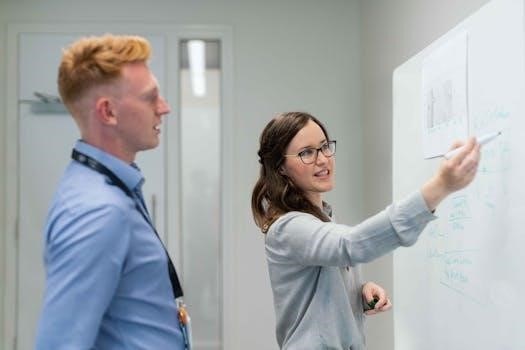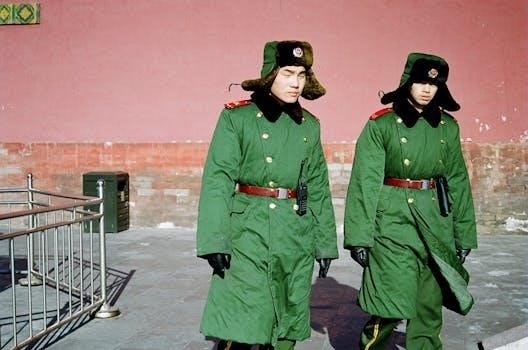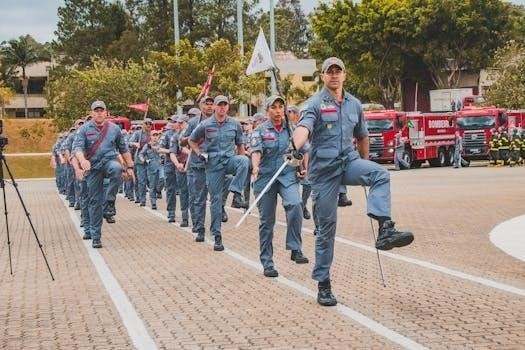Non-commissioned officers (NCOs) are the backbone of the Army‚ holding positions of authority earned through promotion from the enlisted ranks. They serve as leaders and mentors‚ crucial for mission success and soldier welfare.
What is a Non-Commissioned Officer?
A non-commissioned officer (NCO) is a military leader who has not been commissioned. They typically rise through the enlisted ranks‚ earning their position through experience and demonstrated leadership. Unlike commissioned officers who often enter through academies or officer training programs‚ NCOs gain their authority through promotion. They play a vital role in leading and guiding soldiers‚ acting as a bridge between officers and the enlisted personnel. NCOs are responsible for implementing orders and ensuring the welfare of their troops‚ making them essential to the military structure. Their leadership is a critical component of the military’s effectiveness.
NCO Ranks and Structure
The NCO ranks include positions from Sergeant to Sergeant Major‚ forming a structured hierarchy. This system provides clear lines of authority and responsibility within the enlisted corps.
NCO Rank Progression
NCOs typically advance through the enlisted ranks‚ starting as a junior enlisted soldier and moving up to higher NCO positions. This progression is based on a combination of time in service‚ performance‚ and demonstrated leadership potential. Each promotion brings increased responsibility and authority‚ reflecting the NCO’s growth and expertise. The path includes levels such as Sergeant‚ Staff Sergeant‚ and Master Sergeant‚ culminating in the highest enlisted ranks‚ such as Sergeant Major. This structured advancement ensures that NCOs gain experience and skills needed for higher leadership roles.
Key NCO Responsibilities
NCOs are primarily responsible for mission accomplishment and the welfare of their soldiers; They lead by example‚ ensuring tasks are completed effectively and soldiers are well-supported.
Mission Accomplishment and Soldier Welfare
The core responsibilities of an NCO are twofold⁚ achieving mission objectives and ensuring the well-being of their soldiers. This dual focus requires NCOs to be effective leaders and managers. They must understand the mission‚ plan effectively‚ and execute tasks to meet the commander’s intent. Simultaneously‚ NCOs must prioritize the health‚ safety‚ and development of their subordinates. This involves providing mentorship‚ training‚ and support. By balancing these two crucial aspects‚ NCOs play a critical role in the success of the Army.
NCO Duties and Authority
NCOs have specified‚ directed‚ and implied duties. They are granted authority from commissioned officers to lead‚ train‚ and manage soldiers‚ ensuring mission accomplishment and upholding standards.
Specified‚ Directed‚ and Implied Duties
NCOs carry out specified duties outlined in their job descriptions‚ which are directly related to their Military Occupational Specialty (MOS). Directed duties are assigned by superiors‚ verbally or in writing‚ and include tasks like charge of quarters or staff duty officer. Implied duties‚ often supporting specified tasks‚ are not explicitly stated but are inherent in the NCO role‚ requiring them to take initiative to ensure the smooth operation of their units and the well-being of their soldiers. These duties are crucial for effective leadership and mission success.

NCO Leadership and Mentorship
NCOs are vital leaders‚ responsible for guiding and developing junior soldiers. They provide training‚ support‚ and mentorship‚ fostering growth and ensuring the readiness of their teams.
Training and Development of Junior Soldiers
NCOs play a crucial role in the training and development of junior soldiers‚ focusing on their skills‚ knowledge‚ and professional growth. They are responsible for conducting standards-based training‚ ensuring soldiers are proficient in their duties. NCOs also mentor junior personnel‚ providing guidance and support to help them advance in their careers. Through both formal and informal instruction‚ NCOs prepare soldiers for future responsibilities‚ emphasizing leadership qualities and fostering a culture of continuous improvement within their units. They monitor progress and take corrective actions as needed.

The NCO Support Channel
The NCO support channel is a vital communication network‚ working alongside the formal chain of command. It facilitates the efficient flow of information and tasks among NCOs and enlisted personnel.
Communication and Command within the NCO Corps
Effective communication within the NCO corps is paramount for mission success. This involves the seamless flow of orders‚ feedback‚ and concerns between senior and junior NCOs. NCOs ensure the commander’s intent is understood and implemented. This channel allows for open and honest dialogue‚ fostering a cohesive and efficient team. NCOs facilitate this communication‚ acting as a bridge between officers and enlisted personnel‚ maintaining a clear and reliable information flow. This collaborative effort is essential for effective command and control within the Army.
NCO Competencies and Skills
NCOs must possess essential abilities‚ including leadership‚ technical proficiency‚ and problem-solving skills. They need to effectively train‚ mentor‚ and guide soldiers‚ while also executing assigned tasks.
Essential Abilities for NCOs
NCOs require a diverse set of competencies to effectively lead and manage their teams. These include strong communication skills‚ both verbal and written‚ to clearly convey orders and instructions. They must be proficient in their military occupational specialty‚ possessing the technical knowledge to perform their duties. Furthermore‚ NCOs need critical thinking and problem-solving skills to address challenges and make sound decisions. Leadership qualities such as integrity‚ empathy‚ and the ability to motivate others are also crucial. Finally‚ they must be adept at training and mentoring junior soldiers‚ fostering their growth and development within the Army.

NCO Self-Development
NCOs are encouraged to pursue continuous educational and professional growth. This includes seeking advanced military training‚ engaging in self-study‚ and participating in relevant professional development programs.
Educational and Professional Growth
NCOs are expected to commit to their ongoing development through various means. This includes formal military education courses‚ which enhance their leadership and technical skills. Additionally‚ NCOs should actively seek opportunities for self-improvement through independent study‚ professional reading‚ and participation in workshops and seminars. Furthermore‚ NCOs should strive to broaden their knowledge and capabilities to better serve their soldiers and the Army. This constant self-improvement is essential for career progression and for effectively leading and mentoring junior personnel.
NCO and Officer Relationships
NCOs and officers must collaborate effectively‚ with NCOs providing expertise and officers offering guidance. This partnership is vital for mission success‚ promoting teamwork and mutual respect.
Collaboration and Teamwork
Effective collaboration between NCOs and officers is essential for a cohesive and high-performing military unit. NCOs‚ with their practical experience and leadership skills‚ work alongside officers‚ who provide strategic direction. This synergy ensures that both mission objectives and the well-being of soldiers are effectively addressed. Open communication‚ mutual respect‚ and shared responsibility are the cornerstones of this partnership‚ fostering an environment where teamwork thrives and the unit can achieve its goals efficiently. The combination of NCOs’ tactical expertise and officers’ strategic planning creates a powerful force.

Historical Evolution of NCO Roles
NCO roles have evolved significantly‚ moving from informal positions based on seniority to formalized leadership roles with distinct responsibilities. These changes reflect the increasing complexity of military operations.
Changes in NCO Responsibilities Over Time
Initially‚ NCO duties were less defined‚ often relying on experience and seniority‚ with variations across different armies. Over time‚ NCO responsibilities have become more formalized‚ encompassing leadership‚ training‚ and welfare of soldiers. NCOs now serve as a crucial link between officers and enlisted personnel‚ acting as mentors and trainers. Their roles have expanded to include not only executing orders‚ but also contributing to mission planning and implementation. This evolution reflects a growing recognition of the vital role NCOs play in the military.